Schlagwort: ‘Elektrotechnik’
WirtschaftsWoche University Ranking 2024 confirms excellent reputation in the business world
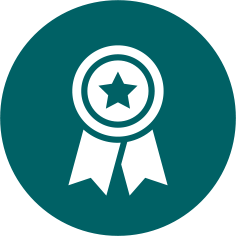
Electrical engineering graduates will have excellent career opportunities in the coming years. But where can prospective students expect the best education?
The consulting firm Universum asked 483 corporate recruiters which university best prepares its graduates for the needs of their companies. The results confirm the outstanding role of RWTH Aachen University in research and teaching: a degree from RWTH is seen to provide optimal preparation for professional life and its associated demands on graduates. Electrical engineering at was ranked third in Germany. About one-third of the surveyed recruiters indicated that they would prioritize hiring graduates from RWTH.
Prof Leonhardt elected to the German Academy of Science and Engineering
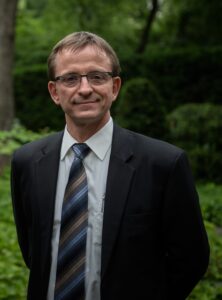
© Andreas Endermann
The German Academy of Science and Engineering, a prestigious private not-for-profit scientific academy, has recently welcomed 39 new members. Among them is Professor Leonhardt, Chair of Medical Informatics. This expansion of the Academy’s expertise strengthens its ability to provide valuable science-based advice to policymakers and society as a whole. Congratulations!
Established in 2002, the German Academy of Science and Engineering plays a crucial role in advising policymakers on science and technology policy. It operates under the umbrella term acatech, a combination of ‘academy’ and ‘technology’, and has a significant impact beyond national borders, representing the interests of German technological sciences at both national and international levels.
In June 2017, Federal President Frank-Walter Steinmeier became the patron of the German Academy of Science and Engineering, highlighting the institution’s dedication to promoting scientific and technological excellence.
We, at the Faculty of Electrical Engineering and Information Technology, are proud to congratulate Prof. Steffen Leonhardt on his election to the Academy.
Delegation visits IIT Madras
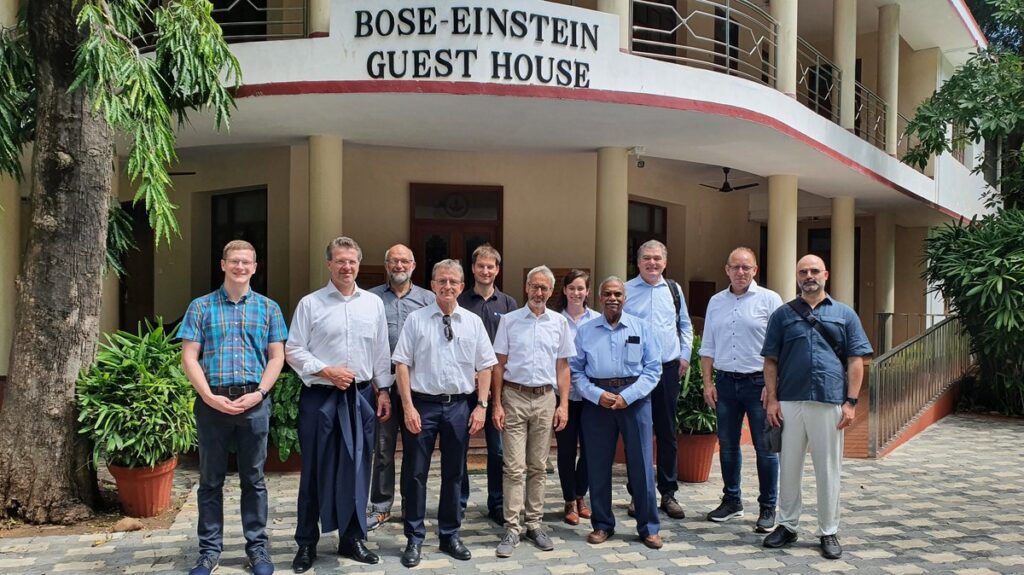
Professor Leonhardt and colleagues © MedIT
The Institute of Medical Information Technology (MedIT) on the road in Chennai, India.
Professor Leonhardt and his colleagues from MedIT and other RWTH institutes visited India in late September, specifically the Indian Institute of Technology (IIT) Madras in Chennai. The aim of this visit was to finalise the proposal for an Indo-German Graduate College.
IIT Madras is a premier university for engineering sciences in India, established in 1959 with assistance from the former West German government. The plans for this were arranged in 1956 during a meeting between Jawaharlal Nehru and Konrad Adenauer. The IIT Madras campus spans 2.5 sq km and has a dense forest. Previously, it belonged to the Guindy National Park. Conservation measures are in place for the campus where most students and staff also reside. A variety of wildlife, such as deer, antelope, axi deer, monkeys, snakes, and scorpions, can be found inhabiting the area.
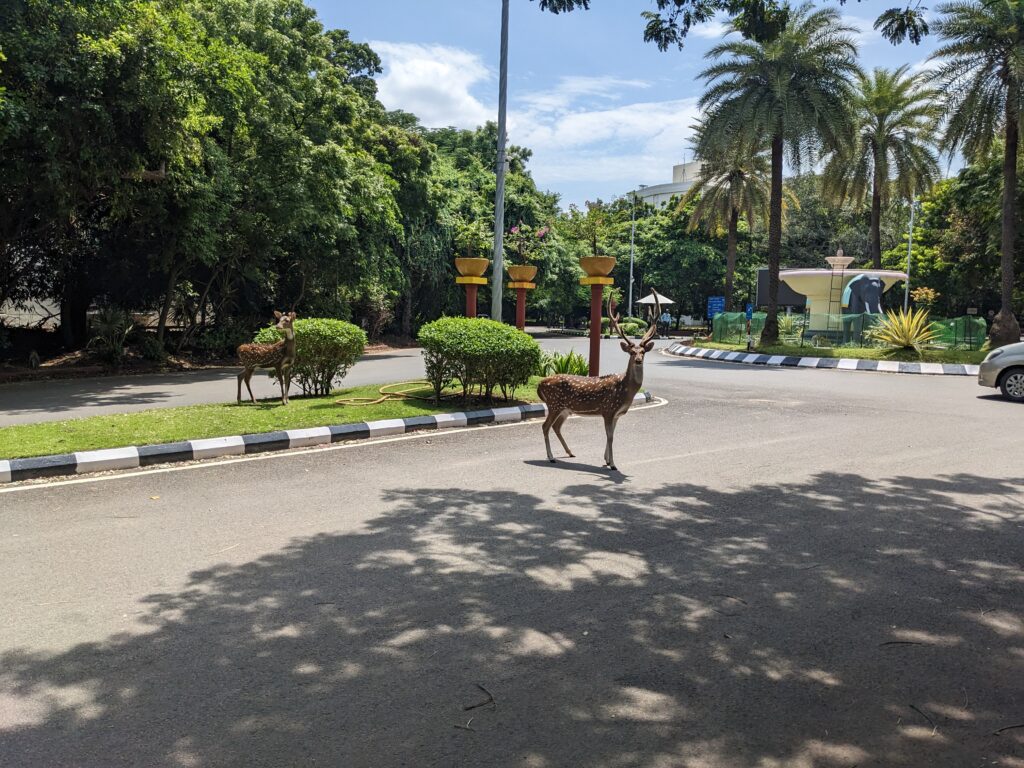
© MedIT
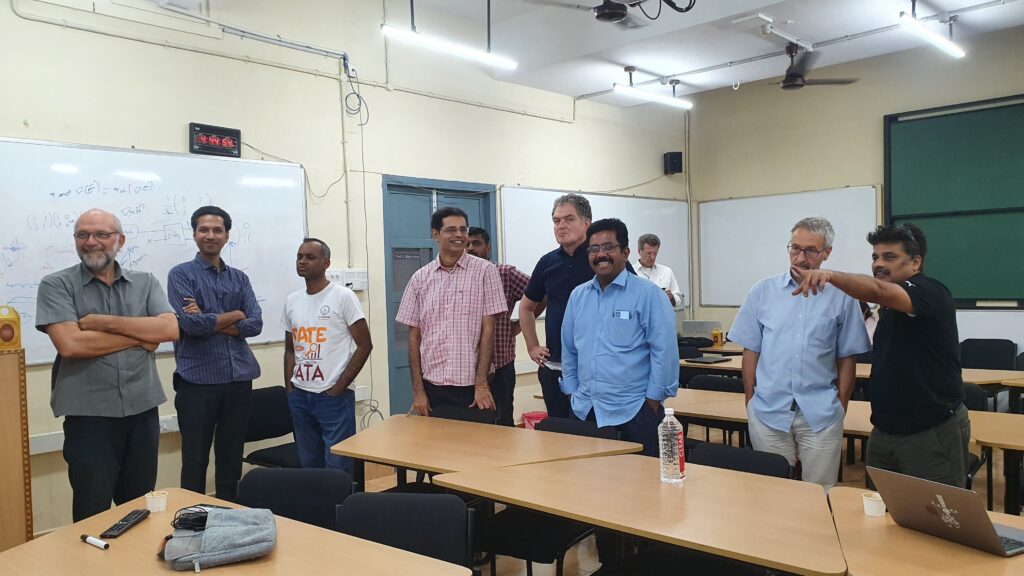
© MedIT
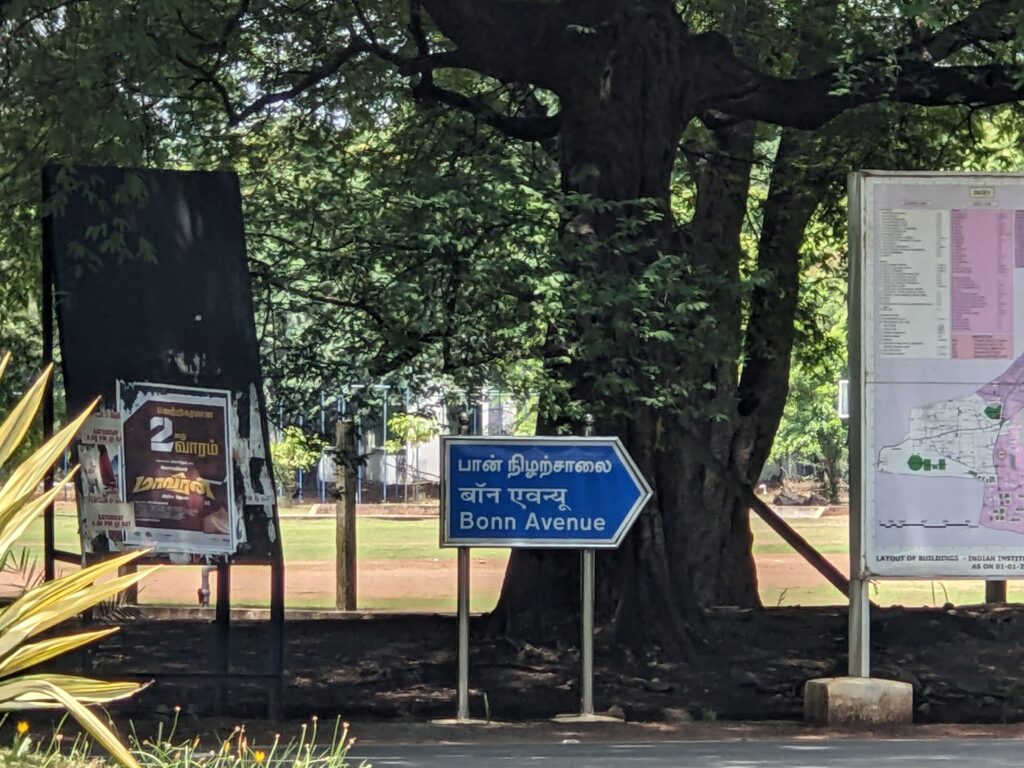
© MedIT
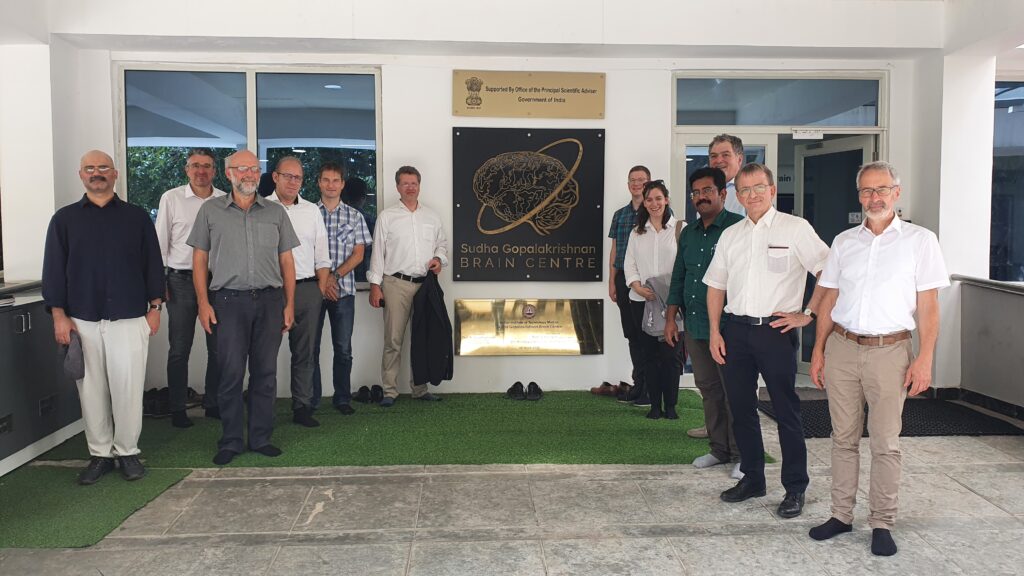
© MedIT
For more news, visit the MedIT website.
CO2For-IT: A data room for the timber industry with a focus on climate protection
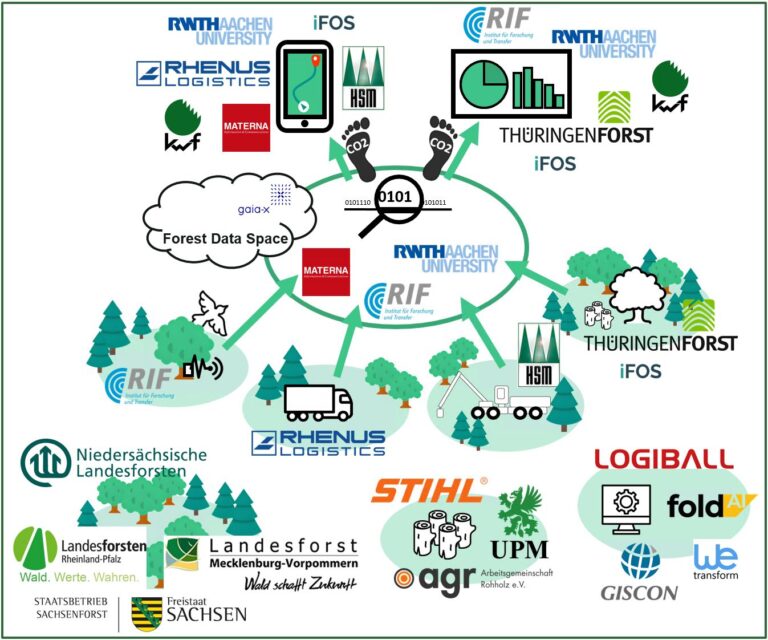
Project partners in CO2For-IT. © Institute for Man-Machine Interaction RWTH Aachen University
A new initiative to promote a climate-friendly timber industry was launched in July 2023. The CO2For-IT project, supported by the Federal Ministry of Economics and Climate Protection, aims to create a “Forest Data Space” to enable the sustainable use of wood from forests.
The Forest Data Space will provide data on the carbon footprint of the entire timber value chain and therefore support the development of data-based solutions for climate protection. The project is led by Materna Information & Communications SE and coordinated by the Dortmund Institute for Research and Transfer (RIF e.V.). Other partners include RWTH Aachen University, Rhenus Forest Logistics GmbH & Co. KG, HSM Hohenloher Spezial Maschinenbau GmbH & Co. KG, Forstliches Forschungs- und Kompetenzzentrum Gotha (ThüringenForst – AöR) and Kuratorium für Waldarbeit und Forsttechnik e. V. (KWF). In addition, foldAI and iFOS GmbH are collaborating with the project.
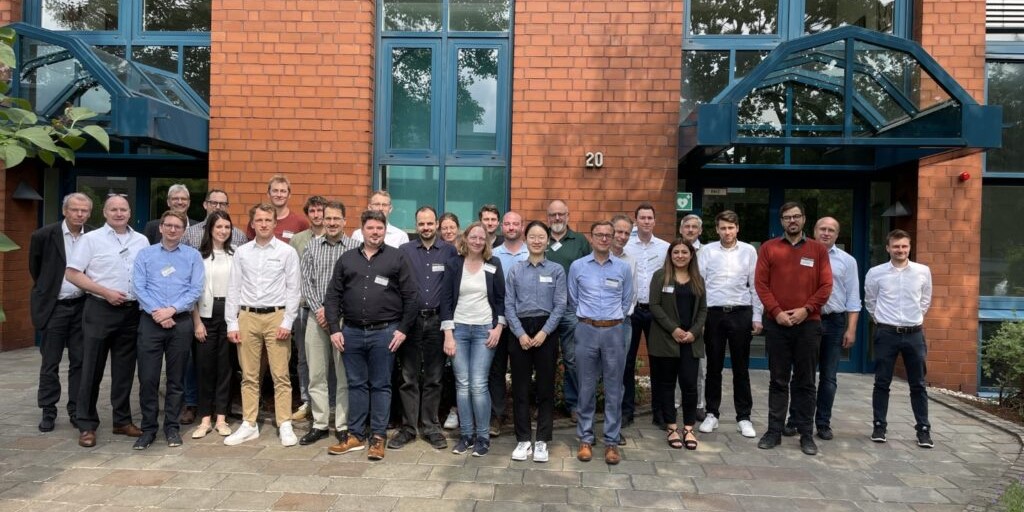
© Institute for Man-Machine Interaction RWTH Aachen University
For more information visit: KWH 4.0 | CO2For-IT (kwh40.de) (only in german)
MedIT looks back on 20 years of history

Happy Birthday!
Since the founding of the Chair of Medical Information Technology (formerly the Philips Chair of Medical Information Technology) on 01.08.2003, a lot has happened: new research areas have been opened up, international collaborations have been established, a branch office has been opened and many young PhD students have graduated here.
MedIT is grateful and proud of this development and would like to share it with old and new colleagues, partners and friends.
To mark this occasion, an anniversary celebration will take place in September 2023, which will also include a symposium in which MedIT would like to discuss the past and future of the chair as well as medical technology in Aachen and the world.
Further information on the lecture programme: Das MedIT feiert sein 20-jähriges Bestehen (rwth-aachen.de) (only in german)
New Perspectives for Communication Technology: A German-Japanese Partnership
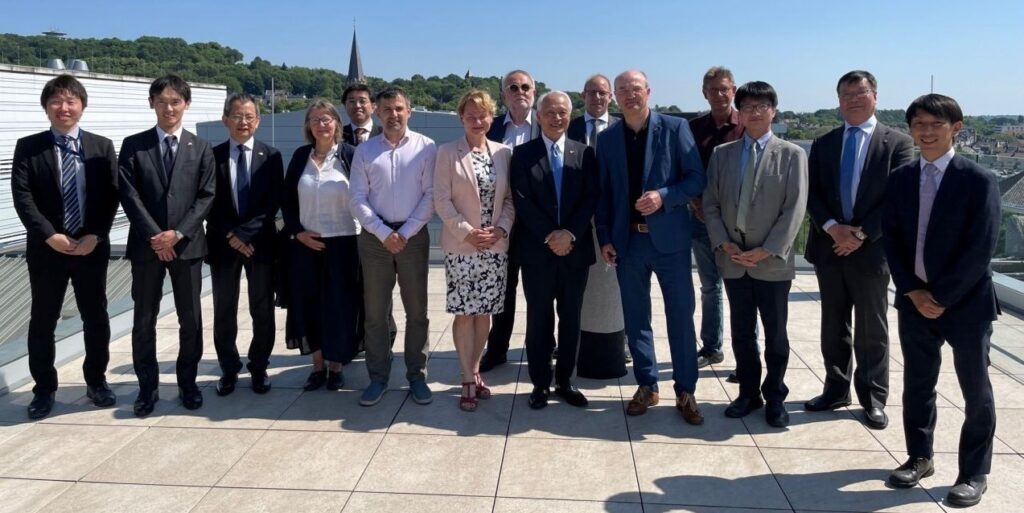
A delegation from the National Institute of Information and Communication Technology (NICT) in Japan visited RWTH Aachen University for the signing of a Memorandum of Understanding. © RWTH Aachen University
RWTH University has started an exciting cooperation in the field of 5G/6G mobile communications technology with the National Institute of Information and Communication Technology (NICT) in Japan. This was sealed by a memorandum of understanding that Professor Ulrich Rüdiger and Professor Hideyuki Tokuda, President of NICT, signed together in June. They received a delegation from NICT at RWTH Aachen University.
The Memorandum of Understanding is intended to strengthen and expand academic cooperation between both partner institutions. This includes the exchange of scientists and students, collaborative research projects, publications and the transfer of knowledge on 5G/6G mobile communications technology.
The cooperation was initiated as part of the BMBF-funded research programme “6GEM Research Hub”, which is coordinated by Professor Haris Gačanin from the Chair of Distributed Signal Processing at RWTH. In this project, RWTH Aachen University, Ruhr University Bochum, Dortmund University of Technology and the University of Duisburg-Essen, as well as the Fraunhofer Institute for Material Flow and Logistics, the Fraunhofer Institute for Microelectronic Circuits and Systems, the Fraunhofer Institute for High Frequency Physics and Radar Techniques and the Max Planck Institute for Security and Privacy are researching future communication technologies in 6G mobile communications technology.
Source: RWTH press release: Research Partnership With NICT in Japan – RWTH AACHEN UNIVERSITY – English (rwth-aachen.de)
Energy Park Herzogenrath: Chair of Electrochemical Energy Conversion and Storage Systems is involved in research
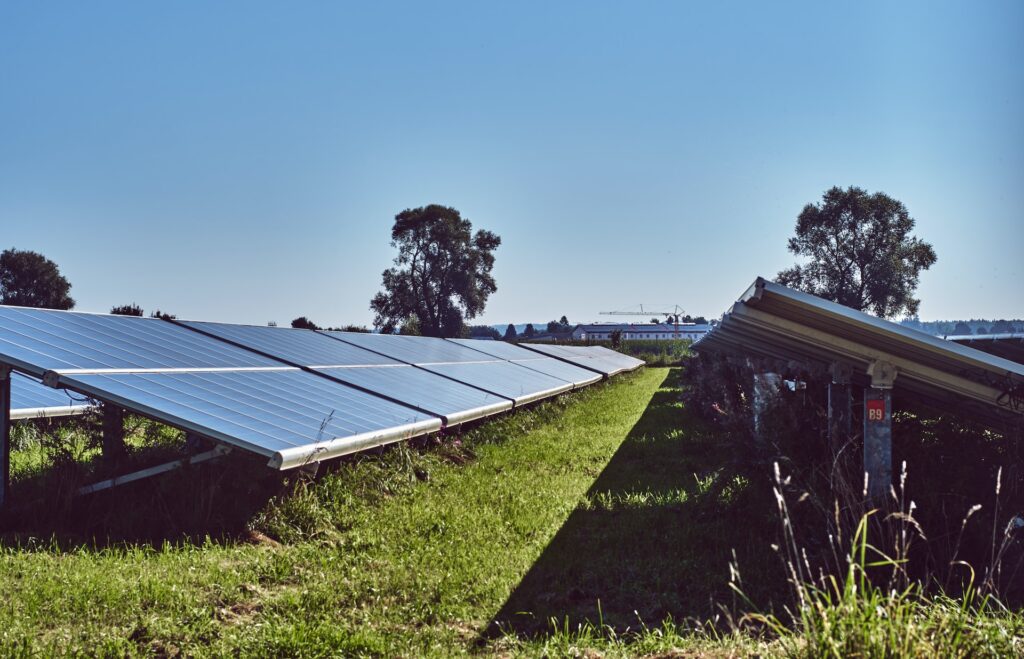
© Michael Förtsch by Unsplash
The project for CO2-neutral energy supply in Herzogenrath, the first city in NRW to strive for this goal, is accompanied by a consortium of four chairs and institutes, including the Chair of Electrochemical Energy Conversion and Storage Systems Technology.
Herzogenrath wants to achieve CO2-neutral energy supply by 2030. A consortium of Siemens Energy, RWTH Aachen University, Aachen University of Applied Sciences and the Niederrhein University of Applied Sciences is conducting research on the project “Energy Park Herzogenrath Research & Development”, which is funded by the Federal Ministry of Economics and Climate Protection with 2.7 million euros. The project is also closely interlinked with other ongoing research and funding projects: at the local flat glass manufacturer Saint Gobain, CO2-free production is being researched, in which the Chair of Electrochemical Energy Conversion and Storage Systems Technology at the E.ON Energy Research Center (ERC) of RWTH Aachen University is involved. The aim is to recycle the heat generated during glass production in Herzogenrath and Kerkrade in the Netherlands as green heating energy.
The project uses a digital twin that virtually maps and simulates the energy supply. In this way, different scenarios can be tested and optimised. The project looks at generation, consumption and marketing options across sectors. RWTH is receiving around 918,000 euros in funding for this.
More information on the project can be found at Energiepark Herzogenrath – Strukturwandel Rheinisches Revier (revier-gestalten.nrw) and at CO2-neutral bis 2030: Forschungsprojekt Energiepark Herzogenrath mit rund 2,7 Millionen Euro gefördert | Wirtschaft NRW.
Climate protection through electrical engineering – Professor Dirk Uwe Sauer’s lecture at the Children’s University
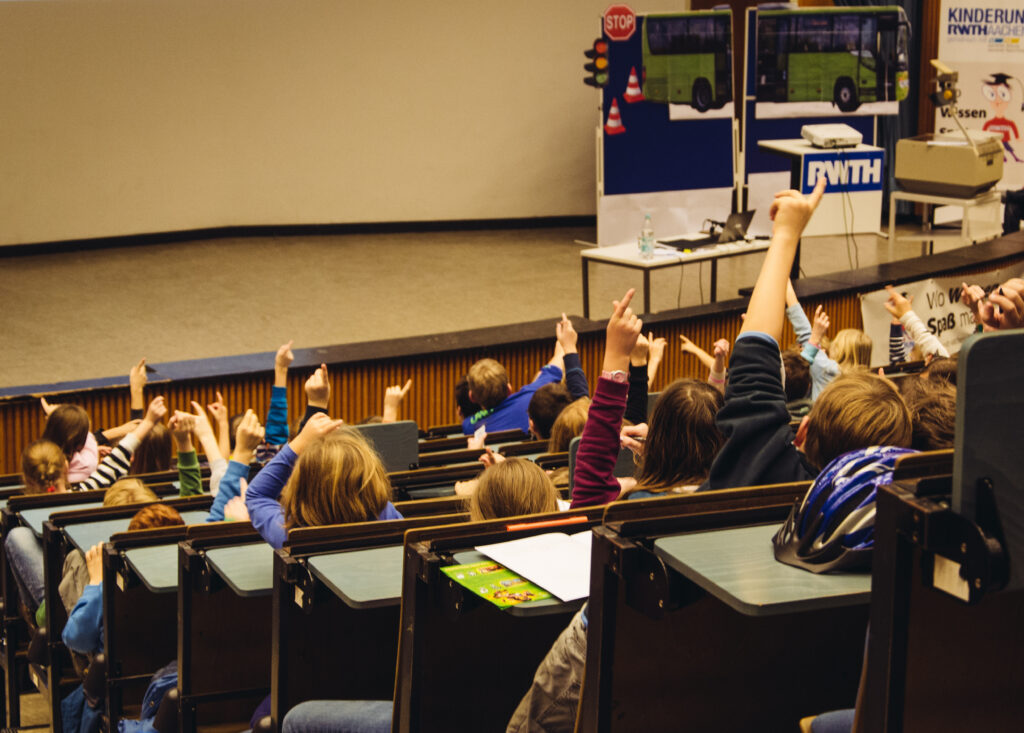
Kinder im Hörsaal. ©RWTH Aachen University
Whether drought, floods or forest fires – the consequences of global warming are dramatic for nature and people. The countries of the global south are being hit particularly hard, but the effects are also being felt here. We experienced this at the latest with the devastating floods in July 2021. That is why we urgently need to address the issue of climate change.
This is also what Dirk Uwe Sauer, Professor of Electrochemical Energy Conversion and Storage Systems Technology at RWTH Aachen University, is doing. He has been researching new energy systems for over 30 years and advises politicians on the energy transition.
„We see in all places that climate change is happening – with many negative consequences. And we urgently need a radical change in the way we have supplied ourselves with energy so far.“
This does not only affect us adults, but especially the children and young people of today. They will have to live with the limitations that climate change will bring. “I don’t think we should underestimate what children know and what they are capable of,” says Professor Sauer.
It is not too late to make a difference
In his lecture, the physicist not only explained the dangers of climate change, but also made the necessary changes understandable. He used various materials such as videos, slides and interactive presentations to show the physical basics and the possibilities through timely action: “I also want to spread optimism and show that things can also get better than they currently are. Because if we still grab the wheel in time, then we still have the possibility to avoid worse things.” For this to happen, however, society must overcome its fear of new technologies. The professor said that there is too much talk about the risks instead of seeing the opportunities. “And we simply can’t afford that now either.” A ruling by the Federal Constitutional Court in 2021 has obliged politicians, and thus the population, to act more quickly. The slower progress is made, the more the living conditions of the next generations are restricted. That is why the previous federal government tightened the climate protection targets and the Climate Protection Act. “We have the opportunity to achieve these goals. We have the necessary technologies to supply all eight billion people in the world properly with renewable energy,” Sauer said.
Climate change is an important issue that concerns us all. But what does it actually mean and how can we work against it? Professor Sauer explained this to the children in his lecture at the Children’s University on 16 June 2023. He showed them how the earth is warming up and what consequences this has for nature and people. He also presented solutions on how we can protect the climate with renewable energies and new technologies. For example, with solar cells that generate electricity from sunlight, or with electric cars that emit no exhaust gases. Professor Sauer showed the children not only the problems of climate change, but also the opportunities that arise from it. He showed them that we can not only influence the climate with our energy supply, but also promote biodiversity.
„I would like to show the children that, for example, large photovoltaic systems on open fields not only generate electricity, but also create space for extensive agriculture, for insects that can live and flourish in these areas again.“
Climate change is a major challenge that we can only overcome together. For this, we need an awareness of the connections between energy and the environment that starts with children. Another goal of the Children’s University event was to get the children excited about scientific topics. “Physics has the great advantage that it can illustrate things very vividly and also show connections,” said Sauer. Using simple means, Professor Sauer showed where research starts and what possibilities can arise through technical progress.
Source: Aachener Zeitung, 16 June 2023
Neuroscience simulators of the future: How a new approach is taking research to the next level
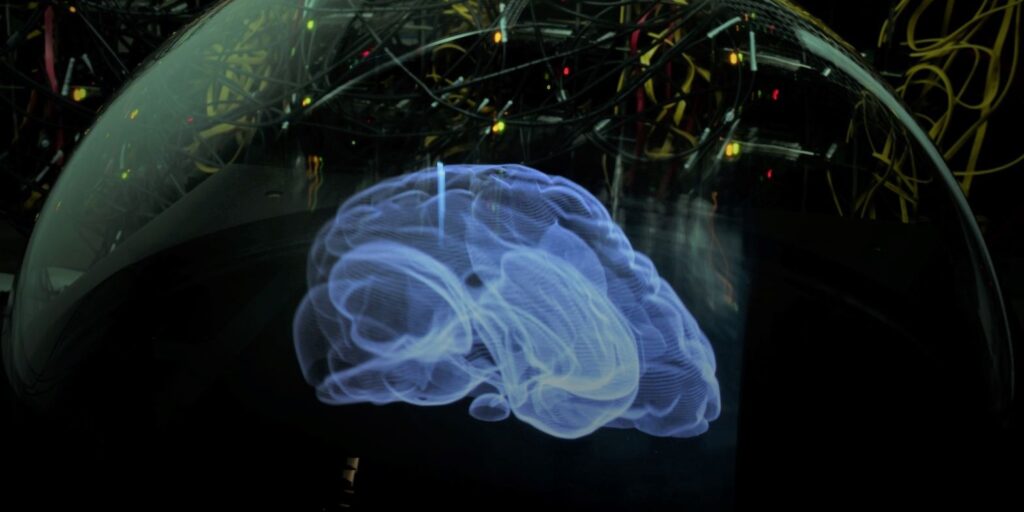
©Chair of Integrated Digital Systems and Circuit Design
A new type of framework called “neuroAIˣ” has been developed by the group of RWTH professor Tobias Gemmeke. This framework is highly flexible and makes it possible to better understand and model the brain and its information processing.
The brain is one of the most fascinating and complex organs, raising many questions. How does it work? How does our consciousness and behaviour emerge from the activity of billions of neurons? How can we learn from the brain to build more powerful and efficient computers?
To answer these questions, neuroscientists are studying the structure and function of microcircuits in the brain, which consist of groups of neurons. These microcircuits are responsible for processing information in different regions of the brain. By analysing how neurons in these circuits work together, they can develop models that explain how the brain processes information and how behaviour results. To test and improve these models, computer simulations of artificial neural networks are essential.
The “neuroAIˣ” framework provides a platform to perform such computer simulations. It is highly flexible and allows different types of neural networks to be created, trained and analysed. Both biologically plausible and artificial neural networks can be considered. The framework is also scalable and can be used on different hardware platforms, from conventional CPUs to specialised chips for brain-inspired computing.
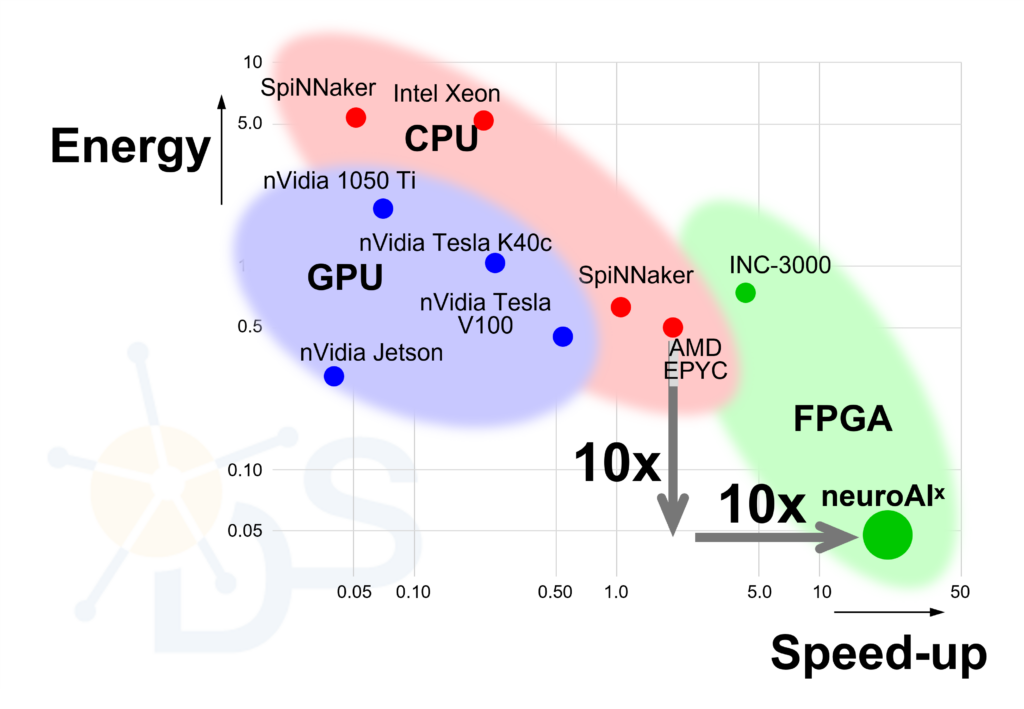
neuroAIˣ FPGA cluster is ten time faster and ten time more energy efficient than today’s best neuroscience simulators at running of biological neural networks. ©Chair of Intrinsic Digital Systems and Circuit Design
The framework consists of two components: a software tool that can rapidly evaluate neuromorphic architectures and a hardware cluster composed of 35 FPGA (Field-Programmable Gate Array) cards. The hardware cluster has two functions: It can be used as a test platform to calibrate the software tool and test the proposed architectures for efficiency. It can also act as a neuroscience simulator, beating the best existing platforms by a factor of ten in terms of speed and energy efficiency.
“We are pleasantly surprised by the high speed-up and energy efficiency achieved by our system, as the focus of our work was on the flexibility and reproducibility of the simulator system,” explains Kevin Kauth, PhD student in Tobias Gemmeke’s group and one of the main developers of the project.
A possible future vision of Gemmeke and his team is to build a high-capacity FPGA cluster and develop a web platform that will allow neuroscientists and AI experts from all over the world to use the cluster via the cloud.
You can find more information about this exciting project at neuroaix.de.
A detailed description of the neuroAIx framework has been reported in the open-access journal Frontiers in Computational Neuroscience.
Encouraging women to take up MINT professions – support for ZDF heute journal
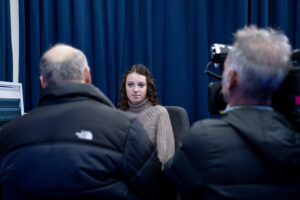
BA student Helena in an interview with the ZDF heute journal team. Photo: C. Antweiler
At the end of January, the team from ZDF heute journal visited the Institute for Communication Systems at RWTH Aachen University for a report. The report provides insights into the topic of “women in MINT subjects”, which are sometimes chosen even less by women and girls, such as mathematics, computer science, natural science and technology. Editor Peter Böhmer from the North Rhine-Westphalia State Studio researched the reasons for the low quota of women at RWTH Aachen University and what approaches could be taken to change this.
Through interviews with various female RWTH students, including our BA student Helena, as well as with Univ. Prof. Dr. rer. nat. Aloys Krieg, Prorector for Teaching, the heute journal team was able to gain an impression. The Institute for Communication Systems and a lecture by Prof. Peter Jax provided the pictorial framework for the report.
You can find the report in the ZDF Mediathek.



